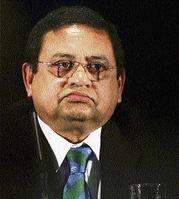
International Cricket Council President Percy Sonn listens during a news conference about correspondence received from umpire Darrell Hair in London in this August 25, 2006, file photo. Sonn died in South Africa yesterday after hospitalisation for colon surgery, the SAPA news agency reported. - Reuters JOHANNEBURG, South Africa (Reuters):
International Cricket Council (ICC) President Percy Sonn, a key figure in the racial integration of the game in his native South Africa, died in a Cape Town hospital yesterday at the age of 57.
The SAPA news agency said Sonn had developed complications after a colon operation.
Sonn succeeded Ehsan Mani as head of the world governing body in June 2006 after two years as the organisation's vice-president.
"Percy Sonn will be mourned throughout the cricketing world as one of the best administrators the game has known," SAPA quoted Cricket South Africa (CSA) Chief executive Gerald Majola as saying.
"He was one of the pioneers of non-racial cricket in South Africa, and was an administrator at the highest level."
Early career
Sonn qualified as a lawyer in 1972 and began his career as an administrator during the apartheid (racial separation) era.
He served as vice-president on the South African Cricket Board and was president of the new United Cricket Board of South Africa for three years until 2003.
In January 2002, Sonn refused to approve the South African team for the second Test against Australia at Sydney because white Jacques Rudolph had been selected ahead of the black Justin Ontong. Ontong subsequently took Rudolph's place.
"It was a great tribute for South African and world cricket that he was able to rise from playing as a youngster in the dusty streets of the townships to the highest office in world cricket," said Majola.
"Percy Sonn fought apartheid both as a cricketer and a civil rights lawyer with vigour and great courage."
Sonn also took on South Africa's rampant crime as a senior counsel and was an acting judge. He served as South Africa's Deputy Director of Public Prosecutions, and was a legal adviser to the police.
He formed and headed the Directorate of Special Operations in South Africa, a crack investigative police unit modelled on the Federal Bureau of Investigation in the United States.
Sonn leaves a wife, Sandra, a daughter and two sons.

